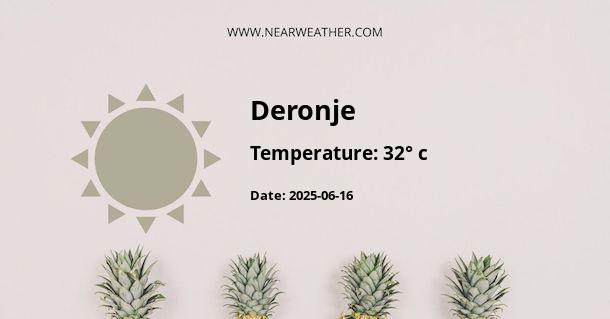Understanding the Climate and Weather Patterns of Deronje, RS
In the heart of the Vojvodina region of Serbia is the small and picturesque village of Deronje. Its location within the Pannonian Plain influences the climate and weather patterns experienced throughout the year. Let's delve into the intricate climatic nuances of Deronje and uncover what makes its weather unique.
The Climate of Deronje: An Overview
Deronje experiences a temperate continental climate, typified by warm, humid summers and cold, dry winters. This classification is based on the Köppen climate classification system, which characterizes the village's climate as Dfb. This climate is marked by significant seasonal temperature variances and moderate precipitation distributed fairly evenly throughout the year.
Seasonal Weather Breakdown
- Spring:
- Summer:
- Autumn:
- Winter:
Arriving in Deronje, spring is a time of rejuvenation, with temperatures gradually rising from cool to comfortably warm. March typically sees a mixture of late winter chill and early spring thaw, with an average low of 2°C (35.6°F) and a high of 12°C (53.6°F). By May, the weather can warm to daytime highs averaging around 24°C (75.2°F).
Summers in Deronje are generally hot, with July being the hottest month. Temperatures can soar to an average high of 29°C (84.2°F), with evening lows providing slight relief averaging at a comfortable 15°C (59°F). Summers can also be characterized by occasional heat waves.
This season brings a noticeable cooling as the landscape is adorned with beautiful autumnal hues. September remains pleasant, with highs around 23°C (73.4°F), while November sees a sharper decline in temperature to an average high of 11°C (51.8°F).
The cold grip of winter is firmly held in Deronje, with average lows in January, the coldest month, reaching -3°C (26.6°F), and highs barely climbing above the freezing mark at 3°C (37.4°F). Snowfall is common, adding a serene white blanket to the region.
Monthly Temperature and Precipitation Table
| Month | Avg High Temp (°C) | Avg Low Temp (°C) | Avg Precipitation (mm) |
|---|---|---|---|
| January | 3 | -3 | 35 |
| February | 6 | -2 | 30 |
| March | 12 | 2 | 40 |
| April | 18 | 7 | 50 |
| May | 24 | 12 | 60 |
| June | 27 | 15 | 70 |
| July | 29 | 16 | 60 |
| August | 29 | 16 | 50 |
| September | 23 | 12 | 40 |
| October | 18 | 7 | 50 |
| November | 11 | 3 | 50 |
| December | 5 | -1 | 45 |
Dealing with Variability: Winds Influence
The wind patterns in Deronje add another layer of complexity to its weather. Winds like the Košava can influence temperature and precipitation. Originating in the Carpathians and funneling through the valleys of the Danube, the Košava can carry cold or warm air masses, impacting Deronje's weather and farming conditions.
Extreme Weather: An Increasing Concern
Like many parts of the world, Deronje is not immune to the realities of climate change. In recent years, extreme weather events, including intense heat waves, severe thunderstorms, and cold snaps have been noted. These can lead to destructive hail storms that impact agriculture, a mainstay of the local economy.
Understanding Deronje's Microclimate
Within the Vojvodina region, microclimates can exist due to variations in topography, vegetation, and human activity. Deronje, like many rural areas, may experience slightly different weather than nearby urban centers. Its agricultural lands can influence local humidity levels and even temperature—impacts that must be considered by local farmers.
Climate Research and Forecast Modeling
As with any location facing the vicissitudes of weather and the larger implications of climate change, research is ongoing. Local meteorological stations collaborate with international climate research organizations to better predict and model weather patterns. Investment in these models improves forecasting reliability, which is crucial for agriculture planning and for the safety of the residents.
Preparation and Adaptation Strategies
"Being prepared for weather variability is indispensable for regions like Deronje, where agriculture has been the lifeblood for generations. Advanced forecasting and adaptive techniques are being adopted to safeguard crops against an unpredictable climate."
- Investment in irrigation systems mitigates the effects of drought.
- Weather-resistant crop varieties are being developed and used.
- Harvest schedules and techniques are becoming more flexible to adapt to climate variability.
Conclusion
Deronje's climate is a mosaic of continental weather patterns, influenced by macro and microclimatic factors. From its warm summers to its snowy winters, weather shapes the daily life and future of this serene Serbian village. By continuing to understand and adapt to its climate, Deronje can maintain its charm and vitality in the face of changing global weather patterns.
A - Deronje's Latitude is 45.454170 & Longitude is 19.218330.
A - Weather in Deronje is 5° today.
A - Climate Conditions in Deronje shows light rain today.
A - Humidity in Deronje is 49% today.
A - Wind speed in Deronje is 14.11 km/h, flowing at 253° wind direction. today.
